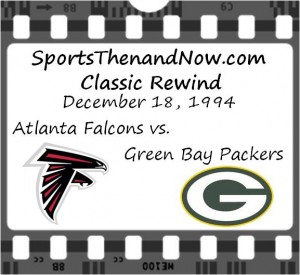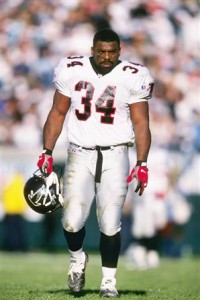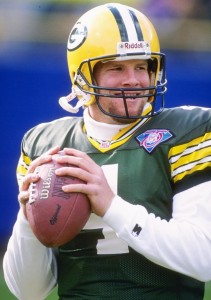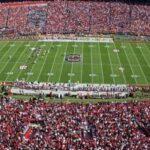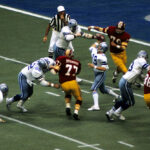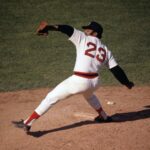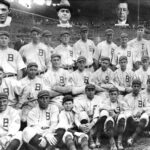Classic Rewind: Favre Runs Packers Past the Falcons
Beginning in 1933, the Green Bay Packers would play two or three home games in Milwaukee in an effort to draw extra revenue.
In 1955, the team almost moved to Milwaukee permanently unless the team built a new stadium in Green Bay to replace City Stadium which was seen by the NFL as too small and too inadequate.
Two years later, Lambeau Field opened in Green Bay but the team continued to play a few of its eight home games in Milwaukee at County Stadium, which was originally for the city baseball’s team at the time, the Milwaukee Braves.
But on October 12, 1994, Packers president Bob Harlan announced that starting with the 1995 season, the team would play all of its home games at Lambeau Field.
Two months later, the Packers played their final home game in Milwaukee against the Atlanta Falcons in a critical game for both teams and their chances for the postseason.
The Packers entered the game with a 7-7 record and needing to win their final two games of the season to make the playoffs for the second consecutive year.
Green Bay was in the third year of the Brett Favre era, as he became the team’s starting quarterback back in the fourth game of the 1992 season, the first season with Mike Holmgren as head coach.
The Packers finished that season with a 9-7 record, just missing the playoffs, but made it to the playoffs in 1993 with a 9-7 record where Green Bay defeated the Detroit Lions 28-24 in their NFC Wild Card game before being eliminated by the eventual world champion Dallas Cowboys the following round.
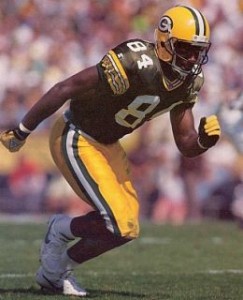
No one could have known that the game against Atlanta would be the final game of Sterling Sharpe's NFL career.
Their opponent, the Atlanta Falcons, also needed to win this game to keep their playoff hopes alive as they entered the game with a 6-8 record under first year head coach June Jones and his “Run n’ Shoot” offense led by Jeff George, who the Falcons acquired from the Colts.
However, the Falcons had the league’s worst defense entering this game and things did not look to get much better for Atlanta as it prepared Favre and the league’s fourth best offense.
The Packers dominated the first quarter as they jumped out to a 14-3 lead, thanks to two touchdown passes from Favre.
The first touchdown pass was an 8-yarder to all-pro wide receiver Sterling Sharpe, who caught the ball at the three-yard-line, then made a 180 degree spin to lose his defender, and then walked in for his 18th touchdown of the season and a 7-0 Packers lead.
Following a 20-yard field goal by Norm Johnson that cut the lead to 7-3, Favre lead the Packers down the field again and into the end zone, this time finding Anthony Morgan from 15 yards out to increase the lead to 14-3 with 13 seconds to play in the quarter.
But after the second touchdown, the Packers offense would struggle to get some points as it wasted numerous opportunities to increase their lead.
Three times the Packers drove to inside the Falcons’ 35-yard-line, but came away with zero points as Chris Jacke missed two field goals from 51 and 37 yards respectively, and Favre was intercepted by Falcons defensive back Darnell Walker in the end zone.
The Packers’ offensive struggles was compounded by the loss of Sharpe, who left the game with 4:12 left in the second quarter after a hit from Falcons defensive back Brad Edwards.
Originally diagnosed as a shoulder stinger, the injury was much worse as Sharpe damaged the top two vertebrae in his neck.
Not only did Sharpe not come back into the game, he would never play another down in the NFL as he was forced to retire after only seven seasons in the league, all with the Green Bay Packers.
The Falcons had injury problems of their own as quarterback Jeff George broke a finger on his hand just four plays into the game and was replaced by former Saints quarterback Bobby Hebert.
In the second quarter, Hebert lead the Falcons on a touchdown drive that culminated with a 2-yard touchdown run by Craig “Ironhead” Heyward that trimmed the Packers’ lead to 14-9 with 6:28 left in the second quarter. Atlanta went for two points after the touchdown and failed to convert.
Then in the fourth quarter, Hebert and the Falcons drove 76 yards for the go-ahead touchdown, a 5-yard pass from Hebert to Terrance Mathis and with a two-point pass to Andre Rison, Atlanta lead 17-14 with 5:33 left in regulation.
The Packers went three-and-out on their next possession, giving the ball back to the Falcons with 4:41 remaining and a chance to ice the game.
The Falcons got one first down, but would go no further and were forced to punt, giving the Packers a chance to at least tie the game as they took possession at their own 33-yard-line with 1:58 to play and just one timeout.
The drive got off to a great start as Favre found tight end Mark Chumra for a 25-yard gain on the very first play, putting Green Bay into Falcons territory at the Atlanta 42-yard-line.
Favre went back to Chumra on the very next play but Chumra dropped the pass on what would have been a first down.
Favre’s next two passes went to Robert Brooks, who gained 13 yards on two catches, giving the Packers a first down at the Falcons’ 29-yard-line.
Following an incomplete pass, Favre found Morgan for a four-yard-gain, then went back to Brooks, as his eight-yard catch gave the Packers another first down at the Falcons’ 17-yard-line.
Favre then spiked the ball stop the clock and then hit Chumra for an eight-yard gain, forcing him to burn the Packers’ last timeout with 21 seconds to play.
Facing a third-and-two at the Falcons’ nine-yard-line, Holmgren and the Packers coaches designed a play for Favre to find Chumra in the end zone.
If Chumra was not open, Favre was throw the ball away and the field goal unit would come on to try and win the game on fourth down.
As the play unfolded, Favre rolled right and found that all five of his receivers were not open and that Falcons defensive end Chuck Smith was on his way toward Favre.
So Favre took off and ran the ball, dodging a diving Smith at the 9, stumbling at the 6, before gathering himself together and diving from the 3 and into the end zone for a touchdown.
If Favre had been tackled in bounds, it is likely that the Packers would have been unable to get another play off.
But Favre made it into the end zone and after Jacke’s extra point, the Packers lead 21-17 with 14 seconds to go.
The Falcons could not muster a miracle in the final seconds as Hebert’s last play Hail Mary pass fell incomplete and ending the game which eliminated the Falcons from playoff contention.
The following week, the Packers traveled home to Green Bay where they defeated the Tampa Bay Buccaneers 34-19 to clinch a playoff berth for the second year in a row.
It was the second year of the Packers’ six-year run into the playoffs where Green Bay won two NFC championships and won Super Bowl XXXI.
County Stadium would remain open for six more years as the home stadium of the Milwaukee Brewers before being torn down on February 21, 2001 as the team moved into its new retractable-roof stadium, Miller Park.
Most of the site has been replaced by parking lots for Miller Park, with the exception of a Little League baseball field that sits on the old infield.
